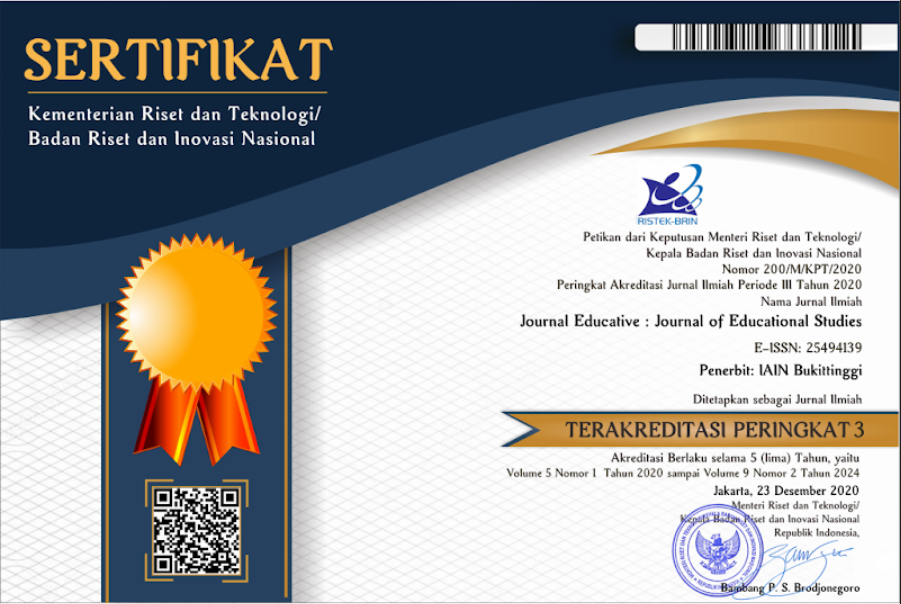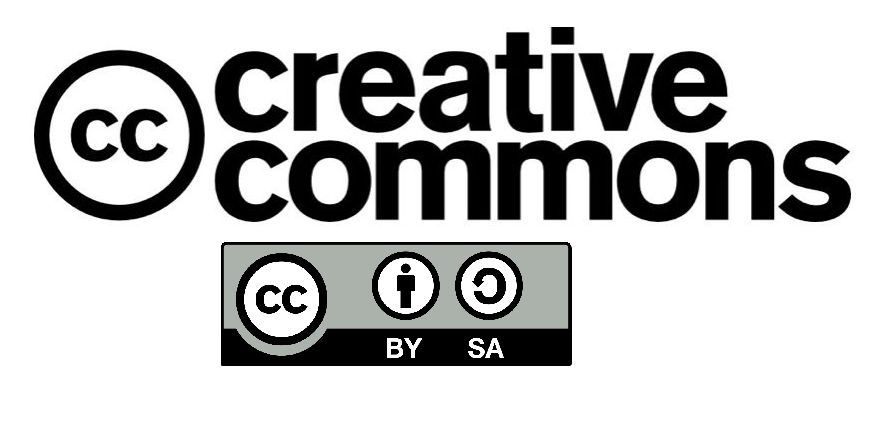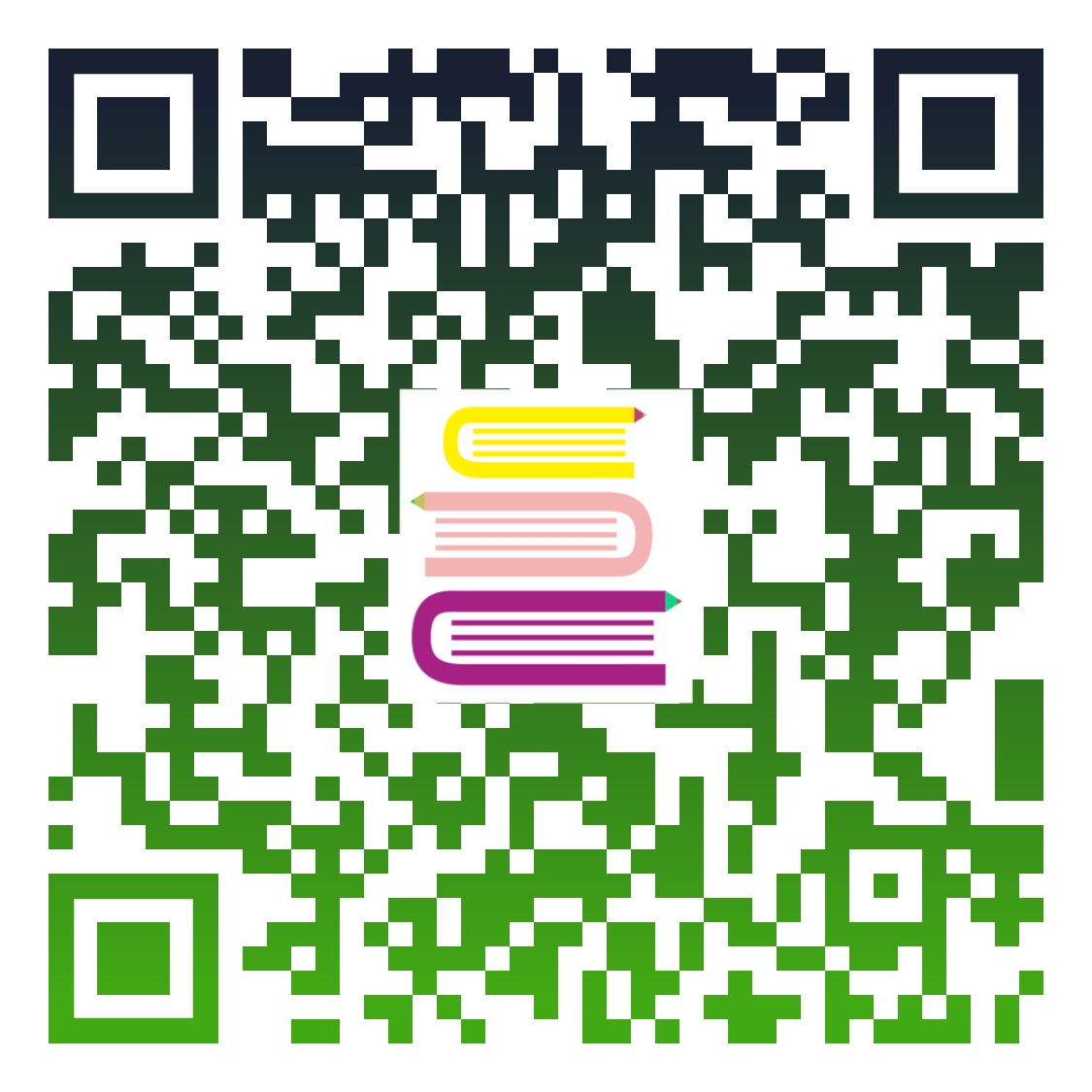- Focus and Scope
- Section Policies
- Peer Review Process
- Publication Frequency
- Open Access Policy
- Archiving
- Publication Ethics
- Plagiarism Policy
- References Management
Focus and Scope
Focus and Scope
Jurnal Educative: Journal of Educational Studies publishes original articles on the latest issues and trends occurring internationally in curriculum, instruction, learning, policy and preparation of teachers with the aim to advance our knowledge of education theory and practice.
In addition to original articles, the journal features the following special sections:
- Critical Perspectives in Education : composed of empirical research, conceptual arguments, or reviews that focus on learning, pedagogies, cirricula, or initiatives that explicitly question or challenge the dominant goals and aims of the field. This may include macro- (e.g., policy) or ground-level (e.g., classrooms, out-of-school, community settings) considerations of: sociopolitical contexts of oppression, their intersections, anti-oppressive directions, and/or alternative possibilities as they pertain to education.
- Learning : consisting of theoretical and empirical research studies on learning. We invite manuscripts that investigate learning and its change and growth from various lenses, including psychological, social, cognitive, sociohistorical, and affective. Studies examining the relationship of learning to teaching, the knowledge and practices, the learners themselves, and the contexts (social, political, physical, ideological, institutional, epistemological, and cultural) are similarly welcome.
- Issues and Trends : consisting primarily of analytical, interpretive, or persuasive essays on current educational, social, or philosophical issues and trends relevant to the teaching. This special section particularly seeks to promote informed dialogues about current issues in education, and carefully reasoned papers representing disparate viewpoints are welcomed. Manuscripts submitted for this section may be in the form of a position paper, a polemical piece, or a creative commentary.
- Education Policy : including reports about the goals and/or underlying principles of policies adopted by government, interest groups, school districts, etc., and their effect on teaching and learning. Additionally, research on education policy relates to a critical examination of how theory, research, and practice of education are influenced by policy decisions.
- Learning in Everyday Life : consisting of analytical, interpretative, or philosophical papers regarding learning outside of the formal classroom. Papers should investigate experiences in settings such as community, home, the Internet, after school settings, museums, and other opportunities that develop science interest, knowledge or practices across the life span. Attention to issues and factors relating to equity in learning are especially encouraged.
- Teacher Education : consisting of original empirical and/or theoretical research that examines the preparation of teachers, the work of teachers, or how teachers' work is influenced by a broader context. "Teacher education" refers to development throughout the continuum of one’s teaching career, from pre-service, through induction, into advanced professional stages of teaching.
Section Policies
Articles
Peer Review Process
Some policies in reviewing process of Jurnal Educative: Journal of Educational Studies
- All manuscripts submitted to this journal must follow Focus and Scope and Author Guidelines of this journal. The submitted manuscripts must fulfil scientific merit or novelty appropriate to the focus and scope of this journal.
- All manuscrips submitted to this journal must be written in good English or indonesian. Authors for whom English or Indonesian is not their native language are encouraged to have their paper checked before submission for grammar and clarity. The work must not have been published or submitted for publication elsewhere.
- The submitted manuscripts to this journal will be peer-reviewed at least 2 (two) or more expert reviewers from International Peer-Reviewers. The reviewers give scientific valuable comments improving the contents of the manuscript. Sometimes (if required) a third peer-reviewer is needed to give critical comments to the submitted manuscript. The review process used in this journal is double blind review system.
- All submitted manuscripts must be free from plagiarism contents. All authors are suggested to use plagiarism detection softaware to do the similarity checking (please use Turnitin to check the similarity). Editors will also check the similarity of manuscripts in this journal by using a Turnitin software
- Final decision of manuscript acceptance is solely made by Editor in Chief (together with Associate Editors and Editorial Board if required for consideration) according to reviewers critical comments. The final decision of manuscript is solely based on the Associate Editor and Editorial Board final review which considering peer-reviewers comments (but not solely by Reviewer).
- Publication of accepted articles including the assigning the article to published issue will be made by Editor in Chief by considering sequence of accepted date and geographical distribution of authors as well as thematic issue.
All articles published Open Access will be immediately and permanently free for everyone to read and download. We are continuously working with our author communities to select the best choice of license options, currently being defined for this journal as follows: Creative Commons Attribution-Share Alike 4.0 International (CC BY-SA 4.0)
Publication Frequency
Jurnal Educative: Journal of Educational Studies is published twice a year in the months of June and December.
Open Access Policy
This journal provides immediate open access to its content on the principle that making research freely available to the public supports a greater global exchange of knowledge.
This journal is open access journal which means that all content is freely available without charge to users or / institution. Users are allowed to read, download, copy, distribute, print, search, or link to full text articles in this journal without asking prior permission from the publisher or author. This is in accordance with Budapest Open Access Initiative.
Archiving
This journal utilizes the LOCKSS system to create a distributed archiving system among participating libraries and permits those libraries to create permanent archives of the journal for purposes of preservation and restoration. More...
Publication Ethics
Jurnal Educative: Journal of Educational Studies (ISSN 2549-4120 and E-ISSN 2549-4139) is a double-blind peer-reviewed journal published by Faculty of Tarbiyah and Teaching Training, State Islamic Institute (IAIN) of Bukittinggi. This statement clarifies the ethical behavior of all parties involved in the act of posting an article in this journal, including the author, the chief editor, the Editorial Board, the peer-reviewed and the publisher. This statement based on COPE’s Best Practice Guidelines for Journal Editors.
Ethical Guideline for Journal Publication
The publication of an article in a peer-reviewed Journal Educative : Journal of Educational Studies is an essential building block in the development of a coherent and respected network of knowledge. It is a direct reflection of the quality of the work of the authors and the institutions that support them. Peer-reviewed articles support and embody the scientific method. It is therefore essential to agree upon standards of expected ethical behavior for all parties involved in the act of publishing: the author, the journal editor, the peer reviewer, the publisher and the society.
Faculty of Tarbiyah and Teaching Training, State Islamic Institute (IAIN) of Bukittinggi as publisher of Jurnal Educative: Journal of Educational Studies takes its duties of guardianship over all stages of publishing exceptionally seriously, and we recognize our ethical and other responsibilities. We are committed to ensuring that advertising, reprint or additional commercial revenue has no impact or influence on editorial decisions. Besides, the publisher and the Editorial Board will assist in communications with other journals and publishers where this is useful and necessary.
Publication decisions
The editor of the Jurnal Educative: Journal of Educational Studies is responsible for deciding which of the articles submitted to the journal should publish. The validation of the work in question and its importance to researchers and readers must always drive such decisions. The editors may be guided by the policies of the journal's editorial board and constrained by such legal requirements as shall then be in force regarding libel, copyright infringement and plagiarism. The editors may confer with other editors or reviewers in making this decision.
Fair play
An editor at any time evaluates manuscripts for their intellectual content without regard to race, gender, sexual orientation, religious belief, ethnic origin, citizenship, or political philosophy of the authors.
Confidentiality
The editor and any editorial staff must not disclose any information about a submitted manuscript to anyone other than the corresponding author, reviewers, potential reviewers, other editorial advisers, and the publisher, as appropriate.
Disclosure and conflicts of interest
Unpublished materials disclosed in a submitted manuscript must not use in an editor's research without the express written consent of the author.
Duties of Reviewers
Contribution to Editorial Decisions
Peer review assists the editor in making editorial decisions and through the editorial communications with the author may also help the author in improving the paper.
Promptness
Any selected referee who feels unqualified to review the research reported in a manuscript or knows that its prompt review will be impossible should notify the editor and excuse himself from the review process.
Confidentiality
Any manuscripts received for review must treat as confidential documents. They must not be shown to or discussed with others except as authorized by the editor.
Standards of Objectivity
Reviews should conduct objectively. Personal criticism of the author is inappropriate. Referees should express their views clearly with supporting arguments.
Acknowledgement of Sources
Reviewers should identify relevant published work that has not been cited by the authors. Any statement that an observation, derivation, or argument reported should accompany by the appropriate citation. A reviewer should also call to the editor's attention any substantial similarity or overlap between the manuscript under consideration and any other published paper of which they have personal knowledge.
Disclosure and Conflict of Interest
Privileged information or ideas obtained through peer review must be kept confidential and not used for personal advantage. Reviewers should not consider manuscripts in which they have conflicts of interest resulting from competitive, collaborative, or other relationships or connections with any of the authors, companies, or institutions connected to the papers.
Duties of Authors
Reporting standards
Authors of reports of original research should present an accurate account of the work performed as well as an objective discussion of its significance. Underlying data should be represented accurately in the paper. A paper should contain sufficient detail and references to permit others to replicate the work. Fraudulent or knowingly inaccurate statements constitute unethical behavior and are unacceptable.
Data Access and Retention
Authors are asked to provide the raw data in connection with a paper for editorial review, and should be prepared to provide public access to such data (consistent with the ALPSP-STM Statement on Data and Databases), if practicable, and should in any event be prepared to retain such data for a reasonable time after publication.
Originality and Plagiarism
The authors should ensure that they have written entirely original actions and if the authors have used the works, or words of others that this has appropriately cited or quoted.
Multiple, Redundant or Concurrent Publication
An author should not, in general, publish manuscripts describing essentially the same research in more than one journal or primary publication. Submitting the same paper concurrently to more than one journal constitutes unethical publishing behavior and is unacceptable.
Acknowledgement of Sources
Proper acknowledgment of the work of others must always be given. Authors should cite publications that have been influential in determining the nature of the reported work.
Authorship of the Paper
Authorship should be limited to those who have made a significant contribution to the conception, design, execution, or interpretation of the reported study. All those who have made significant contributions should be listed as co-authors. Where there are others who have participated in certain substantive aspects of the research project, they should be acknowledged or listed as contributors. The corresponding author should ensure that all appropriate co-authors and no inappropriate co-authors are included on the paper and that all co-authors have seen and approved the final version of the article and have agreed to its submission for publication.
Fundamental errors in published works
When an author discovers a significant error or inaccuracy in his/her own published work, it is the author’s obligation to promptly notify the journal editor or publisher and cooperate with the editor to retract or correct the paper.
Plagiarism Policy
Every submitted paper will go through plagiarism screening by Turnitin Checker. A maximum of 30% similarities are allowed, and above that will be returned to authors for correction.
References Management
In writing Citation and Bibliography, Jurnal Educative: Journal of Educational Studies uses the Mendeley Reference Management Software.





